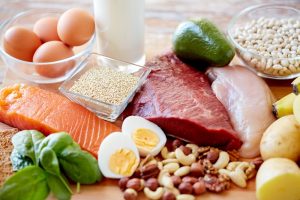The Importance Of Protein
What Is Protein And What Is It Used For?
Protein is one of the three key macronutrients that our body needs to sustain life; it’s present in every single cell in your body (even your hair and nails) and makes up roughly 15% of your body weight. The body doesn’t have a reservoir of protein it can draw upon when it needs to because it doesn’t store protein, so it’s your job to maintain an incoming supply. It’s made up of amino acids and helps to build and repair tissue and muscle mass, as well as create enzymes, hormones, bones, muscles, cartilage, skin and blood.
Where Can I Find Good Sources Of Protein?
You can find protein in animal products (steak, beef, pork, chicken, turkey, salmon, tuna, sardines, mackerel), dairy products (yoghurt, cottage cheese, eggs, milk) as well as nuts (cashew, pistachio, almonds) and legumes (beans, lentils) and even foods like quinoa, edamame and soba noodles. Quorn is another fantastic source.
Of course, the bodybuilding/fitness industry is also blessed with a large number of excellent protein supplements too.. the various types all have different key benefits and should be taken at different times of the day – heres a quick run down of the various protein sources and when they are best taken:
Types Of Protein
Whey Concentrate – This is an inexpensive protein source, great for beginners. Some people struggle to digest it, and as a result it can leave them feeling bloated and more prone to flatulence. It can be taken before or after a workout, as well as between meals, but not at night!
Casein – Now this is a protein you can consume at night before bed or in the morning to start your day. It takes between 5 to 7 hours to break down, and your body continues to absorb the protein and use these nutrients even in your sleep. As a result, you’ll stay nice and full, and have a constant supply of protein running through your system for hours. Its glutamine content will give your immune system a boost, as well as help with muscle recovery.
Whey Isolates – This is a little on the pricey side, but great if you’re looking for a low carb option. Take this before or after a workout for quick absorption, giving your muscles the nutrients they need to recover and grow.
 Hydrolysate – You may or may not be familiar with this one. It’s considered to be the most expensive source of protein, but also the highest quality. Consume this and you can be sure that your body will have the highest absorption rate of proteins available. It won’t leave you feeling gassy or bloated like whey concentrate, and can be taken pre or post workout.
Hydrolysate – You may or may not be familiar with this one. It’s considered to be the most expensive source of protein, but also the highest quality. Consume this and you can be sure that your body will have the highest absorption rate of proteins available. It won’t leave you feeling gassy or bloated like whey concentrate, and can be taken pre or post workout.
Soy – This is your vegetarian option. It’ll help with muscle recovery because of its high glutamine and BCAA content, the arginine will help nutrition to get to your muscles quicker too. You can count on this to support healthy cholesterol levels because of its isoflavones, and speed up your metabolism to burn fat. You can take this pretty much anytime through the day (pre or post workout, or as a snack) just not at night.
Milk Protein Isolate – This is a mixture of casein and whey proteins and usually used in a blended protein source where there’s multiple types of protein being used. It’s not a popular choice, but can be consumed throughout the day (again, not at night).
Egg Albumin – Aka egg whites. Egg whites have a great amino acid profile to help build lean muscle mass. This doesn’t come in powder form like the other types of protein, but usually as liquid that can be consumed raw (if you’re a little more daring) or cooked (scrambled eggs!). Take this during the day (pre or post workout, and cook as a meal replacement), but not at night.
How Much Protein Should I Take?
For muscle building purposes, as a rough guide, you should ideally be consuming 1.4 -1.7g of protein for each kilogram that you weight. So if you weigh 70kg, then you should be eating at least 98g of protein a day.
To get your basic RDA, men should be taking a minimum of 55g and women 45g of protein every day.
